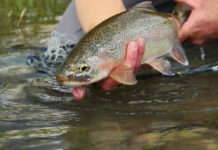Sep. 2—The New Mexico Supreme Court issued a written opinion Thursday explaining its March ruling against landowners seeking to block public access to streams too shallow for boating that flow across their properties.
The high court stated in a concise opinion people have the constitutional right to wade in streams on private property even though the beds beneath the water belong to the landowner.
The decision, made from the bench in March, dissolved a rule the State Game Commission enacted under former Gov. Susana Martinez that enabled property owners to request certification to install barriers and “no trespassing” signs across the water.
“Walking and wading on the privately owned beds beneath public water is reasonably necessary for the enjoyment of many forms of fishing and recreation,” the court said in the opinion.
The decision clarified a gray area in a 1945 state Supreme Court ruling that said the public has the right to boat, fish and engage in other forms of recreation on waters — in that case a lake — abutting private property.
It defines the public easement as extending to the property under the water so long as the impact is reasonable for the recreational use.
The users are not allowed to go onto the adjoining properties, either to get in or out of the water, without the written consent of the owners.
Ranchers were among those who oppose opening their shallow waters to the public, arguing it will disrupt their grazing operations.
And while many outdoor recreation groups support the greater public access to streams on private lands, some fishing guides and outfitters argued it would hurt their businesses.
The previous Game Commission reasoned public access was limited to navigable waters. It established regulations in 2018 allowing property owners to request shallow streams crossing their lands be certified as nonnavigable and, thus, closed to the public.
At the time, those who espoused greater access argued the rule would severely crimp recreation because nearly all of the state’s waterways are nonnavigable. Fly-fishing and paddle boarding would’ve been among the most affected activities.
Nick Streit, who owns Taos Fly Shop, said he’s glad to see the court clarify its ruling, which should help resolve the uncertainty causing tensions between the public and landowners.
“It’s a step in the right direction,” Streit said.
Streit said he’s sympathetic to both sides. He understands people wanting the freedom to fish wherever it’s good, but he also understands landowners’ concerns about some visitors not being respectful of their properties.
Some outfitters are upset with the ruling because a large part of their business model is making agreements with landowners to bring anglers onto their properties, stock the water with high-quality fish and charging clients top dollar for the privilege, Streit said.
He said he’s mostly in favor of removing restrictions. About
30 percent of his business is guided fishing trips, and
70 percent is selling gear and accessories at his store.
Opening more waters to fishing is likely to encourage more people to take part in that activity and, in turn, buy fishing products, he said.
He cautioned the court’s ruling, although the law of the land, won’t automatically make all landowners welcome strangers wading across their properties.
“Just because the Supreme Court says, ‘Yeah, it’s good,’ it’s still going to be a little bit messy,” Streit said.
Credit: Source link






























